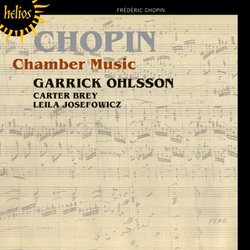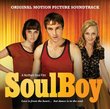| All Artists: Garrick Ohlsson, Carter Brey, Leila Josefowicz Title: Chopin: Chamber Music Members Wishing: 1 Total Copies: 0 Label: Hyperion Original Release Date: 1/1/2010 Re-Release Date: 1/12/2010 Album Type: Import Genre: Classical Styles: Chamber Music, Historical Periods, Classical (c.1770-1830) Number of Discs: 1 SwapaCD Credits: 1 UPC: 034571153841 |
Search - Garrick Ohlsson, Carter Brey, Leila Josefowicz :: Chopin: Chamber Music
 | Garrick Ohlsson, Carter Brey, Leila Josefowicz Chopin: Chamber Music Genre: Classical To celebrate the 200th anniversary of Chopin's birth, Hyperion has excerpted some of the finest performances from Garrick Ohlsson's complete Chopin project, originally recorded for the Arabesque label and reissued on Hyper... more » |
Larger Image |
CD DetailsSynopsis
Product Description To celebrate the 200th anniversary of Chopin's birth, Hyperion has excerpted some of the finest performances from Garrick Ohlsson's complete Chopin project, originally recorded for the Arabesque label and reissued on Hyperion as a 16-CD boxed set. These discs include some of the finest contemporary Chopin playing and include definitive performances of the complete etudes and mazurkas. Similar CDs
|
CD ReviewsNeglected, Mostly Pleasant Chamber Works, Most Pleasantly Pe C. Pontus T. | SE/Asia | 03/02/2010 (4 out of 5 stars) "With that title, it almost sounds as if the reviewer would like the reviewed item to be better than what he actually finds it to be. Regrettably, as much as I revere Chopin's piano works, my enthusiasm for his chamber works is somewhat lukewarm in comparison. Why is that?
I think the chief reason is that Chopin was a master of small- to medium-scale forms, whereas his large-scale compositions rather survive courtesy their melodic and harmonic mastery than their formal merits. This is particularly true for the Op 8 Piano Trio, written in 1828-9 when Chopin was still a student, which is seldom programmed either in concert or on disc. It also suffers from often weird balances between the instruments--the violin in particular often sounds more like a viola; indeed, Frank Cooper writes in the original liner notes that 'Chopin later even wondered whether a viola might have accorded better with the cello'. Instead, as in the two Concertos, the piano very much dominates the show. Regrettably, I find few memorable moments in the second and third movements--the former dubbed Scherzo but sounding nothing like one. The first movement is indeed darkly pleasant, but the keeper is the energetic Rondo-Finale in the trademark Chopinian style of Slavic dance rhythms. Ohlsson is joined by Leila Josefowicz and Carter Brey in a performance that is pleasantly committed, if a tad low-key (especially in the two inner movements). The sonority of the cello clearly appealed to Chopin--probably because it blends so beautifully with the middle register of the piano; all the chamber music he wrote features the cello. Both the Introduction & Polonaise Brillante and the Grand Duo Concertant are relatively early works--the former roughly contemporary with the Trio, the latter something as unusual as a joint composition between Chopin and French cellist August Franchomme. The Polonaise is unashamedly brilliant and buoyant; the Grand Duo is pleasant at best. Ohlsson and Brey give pleasing accounts of both works, rather emphasising refinement than brilliance in line with rest of Ohlsson's Chopin survey. However, Maisky and Argerich's extrovert virtuosity are more convincing in the Polonaise Brillante (recorded live in Tokyo, 2001). Undeniably, Chopin's late Cello Sonata is often sorely beautiful--such as the second theme of the first movement, the Trio section of the Scherzo and all of the Adagio movement. However, the unignorable flaw is that the Finale fails to close the work in the dazzlingly effective manner of its counterpart in the Piano Sonatas and Concertos. It is with Chopin's memorable way of blending the cello with the piano that Ohlsson and Brey excel, each providing the most unselfish interplay with the other, bringing out the utmost beauty in this introvert and undervalued work. To these ears, this works far better than the pulling and pushing of Maisky & Argerich--except for the Finale where they do find more fire and passion. The original recording was made in July 2000--its sound being vividly natural and intimate, with the somewhat mushy sonorities of Ohlsson's Mason & Hamlin piano providing the ideal blending. Released by Arabesque in 2002, the disc was largely neglected by critics and listeners; it only remained in print for a couple of years. Hopefully, this Helios reissue will draw a larger audience to Chopin's chamber music, which is always mostly pleasant and, at times, really great. Next out is the first volume of the complete Mazurkas (Helios CDH55391)." |


